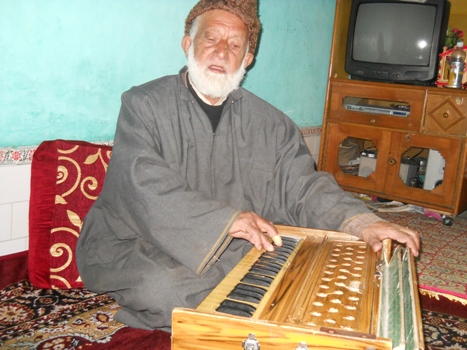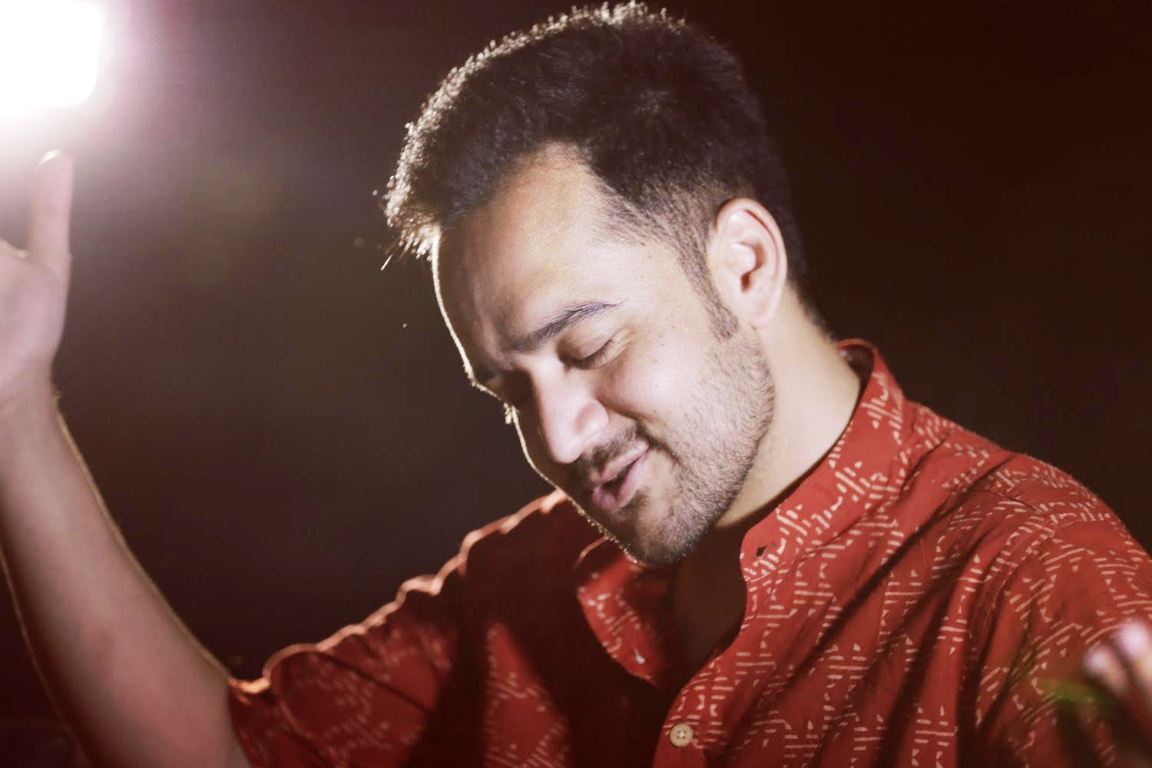
For 60 years Ghulam Qadir Langoo sang for rulers and the people of Kashmir, and his passion for music gave Kashmir, singers like Raj Begum. Shaziya Yousuf reports.
Ghulam Qadir Langoo, 95, spends his days reminiscent of his contribution to Kashmiri Sufiana music. Very few people know Langoo was a court singer for Maharaja Hari Singh.
Langoo’s family had a long association with the royal courts. His grandfather Shabaan Langoo was a Nakaal (entertainer) in Maharaja Pratap Singh’s court. As a child Qadir would accompany his father Mohi-ud-din Langoo to the court of Maharaja Hari Singh where he would watch him play santoor. “Maharaja would get happy and flung a gold coin, that meant much those days,” Langoo says.
Langoo learned music from his father to carry the legacy forward. Langoo’s father would also teach Hafiz Nagma to female dancers at his home.
And like his ancestors, Langoo’s stints in the court hardly brought him any riches. He lived a poor life and spent 60 years singing for the rulers, though he was a little better off than his relatives, who mostly were cobblers. “I sang for the kings, the kings kept changing. I was like an instrument that played for anyone who stroked its cords,” says Langoo.
Apart from Hari Singh, Langoo sang for Sheikh Abdullah, Bakshi Ghulam Mohammad and has also entertained Jawaharlal Nehru and other guests.
He has shared stage with Indian musical greats like Lata Mangeshkar, Aasha Bhonsle and Mahinder Kapoor, mostly playing Tanpura. His mastery over Tanpura (musical instrument) put him into a different class.
The Maharaja’s court, he tells, was different from the royal courts seen on television, with some resemblance though.
A lady dancer, called tawafan would do Hafiz Nagma by dancing and singing to the tunes of Sufi music that Langoo, with his choir, would play. “Guests would relish royal feasts, and sweets would be distributed among musicians. We would take sweets home. I still remember there was a cardamom plant in the royal lawns,” Langoo recalls.
Many decades later, when Radio Kashmir was inaugurated, Langoo sang for whole night in Polo Ground.
“Bhakshi Ghulam Mohammad once told that we can have our own radio station if I get many more singers for it. I worked day and night to gather the artists,” he says.
He was appointed in the station, as a singer and artist but says he would even compose music at times. Once, he says, the station required female singers for some contract. The station had none then. But Langoo was eager to secure the contract and the contract form required photograph of a female singer.
He did something, he now calls his madness. “I used my wife’s photograph (who was not a singer) despite her objections. I left her crying. It was my madness, all I could see was Radio Kashmir.”
Meanwhile they started searching for female singers, in which Langoo had a major role.
“Those days singing and performing arts was an affair of lower class people like my family. So I searched there,” he says. Thus he found and trained singers like Raj Begum, Zoon Begum and Naseem Akhtar.
Slowly music industry grew in Kashmir, and with it grew his passion for it. When Langoo’s only daughter was born, he named her after Raj Begum, who by then was a household name.
“I would sing in her ears…Later I took her to famous musician Shambo Nath Sopori for professional training, but did not let her join Radio Kashmir. It wasn’t a good place for girls,” he says.
In 1964 When Sheikh Abdullah was released from jail after 11 years, Langoo was taken to Pune by Shiekh’s fellow leaders where he sang his favourite song, Walo haa baagwaano and keam sana badlow soan takdeer, qaid-e-azam sheri Kashmir
Langoo and his group were also invited by Jawahar Lal Nehru to his mansion.
At the prime minister’s house where they sang for his Russian guests, Langoo remembers how their group was terrified by the sight of two pet bear cubs, and how a tea that the guests were praising tasted like “poison”.
Among his hosts, Langoo enjoyed singing most for Bakhshi Ghulam Mohammad.
“Just a song of mine and he would forget who he was. He would join the choir and play some instrument mostly Noutt. I still remember how happy he would get,” Langoo recalls.
He sang on the foundation stone laying ceremony of new secretariat building where he says, “My photograph hung in corridors
later, I don’t know if it is still there.”

While Langoo survived on royal patronage, the performing artists of the time were in a bad state. “It was pathetic. They would be always given leftover food. Most famous among the local populace was bacha nagma where a small boy dressed in women outfit would dance before men, he had to entertain each person individually, if he forgot to address someone, the poor boy would be beaten to pulp.”
Since his retirement from Radio Kashmir, some 30 years back, Langoo has been living a private life. For his contribution he has been honoured with Fazil Memorial Award, Bhakshi Ghulam Mohammad Award but the “metallic toys” as he describes them, hardly sum up his contribution to the Kashmiri sufi music.”
















Exquisite article @Shaziya Yousuf…Godbless…(Y)